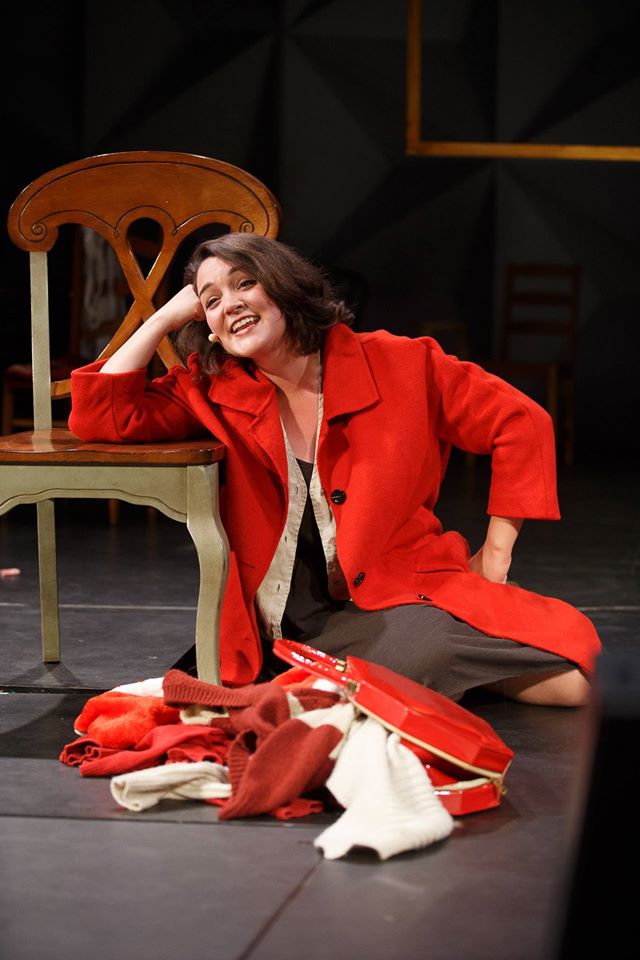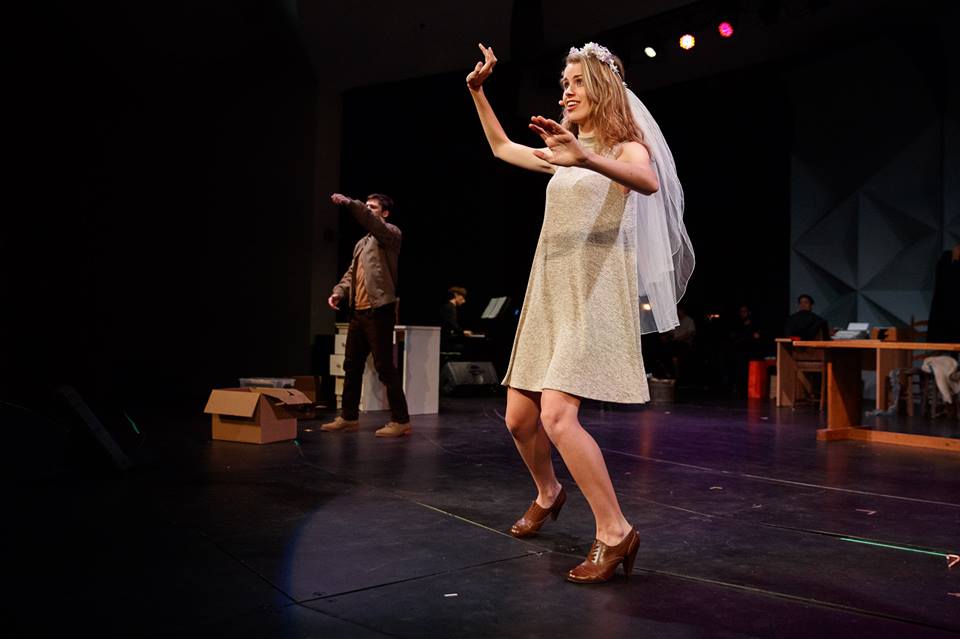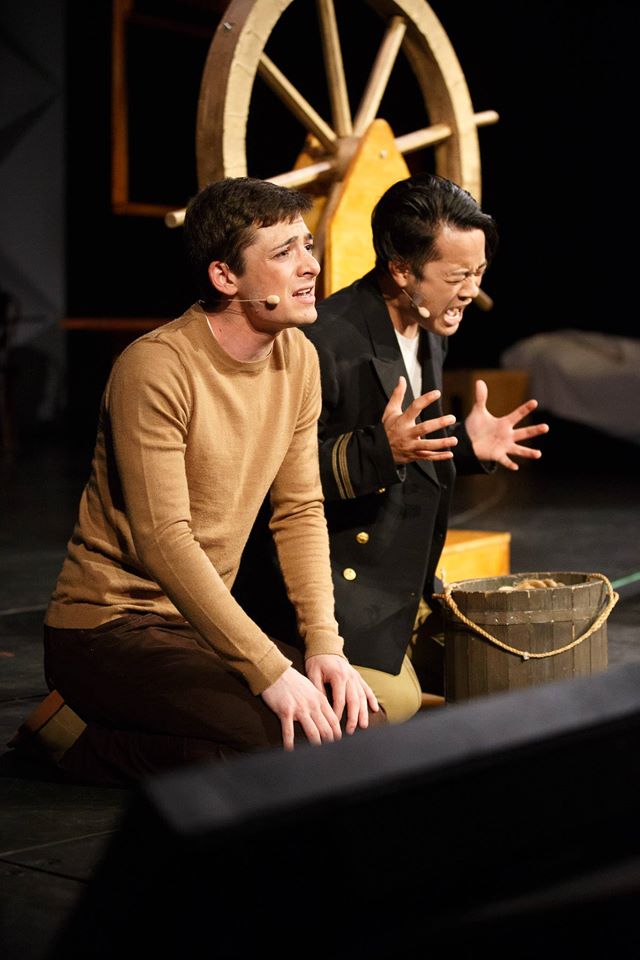
What lurks at a crossroads? What tiny factors converge when we must make a decision? Who is going to be affected by the choices we make? And how are these concepts somehow the perfect fodder for a collection of musical theatre songs?
At the Fountain Theatricals, led by music director/producer Makulumy Alexander-Hills (‘16- Stanford is losing a musical theatre GEM, everyone) and director Elisa Vidales (‘18), explores just these concepts in Songs for a New World, the grandparent of the musical theatre song cycle genre. Featuring two women and two men who are never named in any of the songs, the show is not a narrative, in the sense that it does not have a clear plot. Rather, each song within the show is its own mini-narrative. Jason Robert Brown’s (who I will affectionately call “JRB” hereafter) score and lyrics guide us through the stories of a variety of characters—from kings, to mothers, to lovers, to even Mrs. Santa Claus—each connected by the fact that these people must make a big decision, and enter into their own “new world,” a life after these moments of choice.

The nuance and stakes at hand within facing moments of decision are perfectly suited to the musical theatre genre. As the director who has taught me everything I know about theatre says, music happens when words are not enough. JRB’s melodies and lyrics comprehend the process behind making choices, as well as how an array of characters can be musically portrayed. From the patter-y minor tones of a New York City socialite contemplating jumping out of her penthouse window, to the sentimental, flowing melody of lovers coming back together after a time apart, JRB understands how form follows function in musical theatre. His music crafts the narrative, adding a depth that goes beyond the lyrics alone, that grasps the audience and refuses to let go until the last note is done resonating.
And that’s why JRB’s music is notoriously complex, both for singers and musicians—there are so many layers to it. The score requires both advanced technical skill and a thoughtful understanding of how to uncover truth in performance in order to successfully put it on its feet. Luckily, between the four performers, precise directing choices, and, yes I will say it, genius music direction, ATF’s “Songs for a New World,” lives up to JRB’s exceedingly high standards.

The four performers, David Lopez (‘17), James Seifert (‘17), Amy DuBose (‘15), and Laura Austin (‘16), perform vocal acrobatics, switching effortlessly from different styles of singing, all while making sure to hit every single acting beat. DuBose runs the gamut in performing an array of characters over the course of the show—from boldly and hilariously breaking up with Santa Claus in “Surbaya Santa” to regretting her choice to marry for riches in “Stars and the Moon,” her vocal control effortly conveys the vast difference between her characters. Lopez’s riffing in “King of the World” is utterly insane, willingly going up the octave for the entirety of the last verse, a feat that made me want to break him out of that jail he was singing about. Seifert, who is featured in most of the show’s rather heteronormative dude-songs, pours so much energy and gives so much to his song partners, especially in “I’d Give It All for You.” Austin guides the audience through her nuanced thought processes in an effortless way, especially in “I’m Not Afraid of Anything.”
These performances are bolstered by Vidales’ direction, ensuring each song is placed in a very specific context. Set props remain on stage providing a visual unity throughout the show, reminding the audience that although the songs share universal experiences, their stories are quite specific. When it was time for a new story to be told, the set props came to the foreground. While the set props are minimal in aesthetic, it is for the benefit of the show—the music filled out what was missing from the environment, as JRB’s music allows the audience to imagine the vividness of each song’s world. Some moments, I wished the music would fill the space more, as I felt there was too much contextualizing at points. Did David, as a hairdresser, have to distractingly fluff Amy’s hair for the majority of “Stars and the Moon?” Probably not, and in that, it was harder for me to get lost in that specific story.

However, all of this could not have been done without Makulumy Alexander-Hills’ music and vocal direction. First of all, so few people on this campus music and vocal direct shows, so that’s a crazy feat in itself, and he needs a monument in his honor because of that. This show, also his senior project for the Music Department, is the perfect marriage of his technical abilities as a piano beast (he played JRB’s notoriously difficult piano riffs perfectly without his hands falling off) as well as his sagacity in understanding how music is an extension of the human condition in its ability to convey a story. Makulumy understands that musical theatre is a confluence of the power of words, the complexities of music, and the human spirit—its intersection makes the form such a powerful emotional force. In that, he uncovers dynamics and motifs that I had no idea existed within these songs (and I have the original cast recording on a physical CD, so that’s saying something).
ATF’s Songs for a New World reaffirmed my belief in how simple telling poignant stories can be: four passionate actors, a creative team who guides those actors to understand why what they’re singing matters, and a score that an audience can get lost in and come out on the other end moved and changed.
Photos courtesy of Frank Chen
